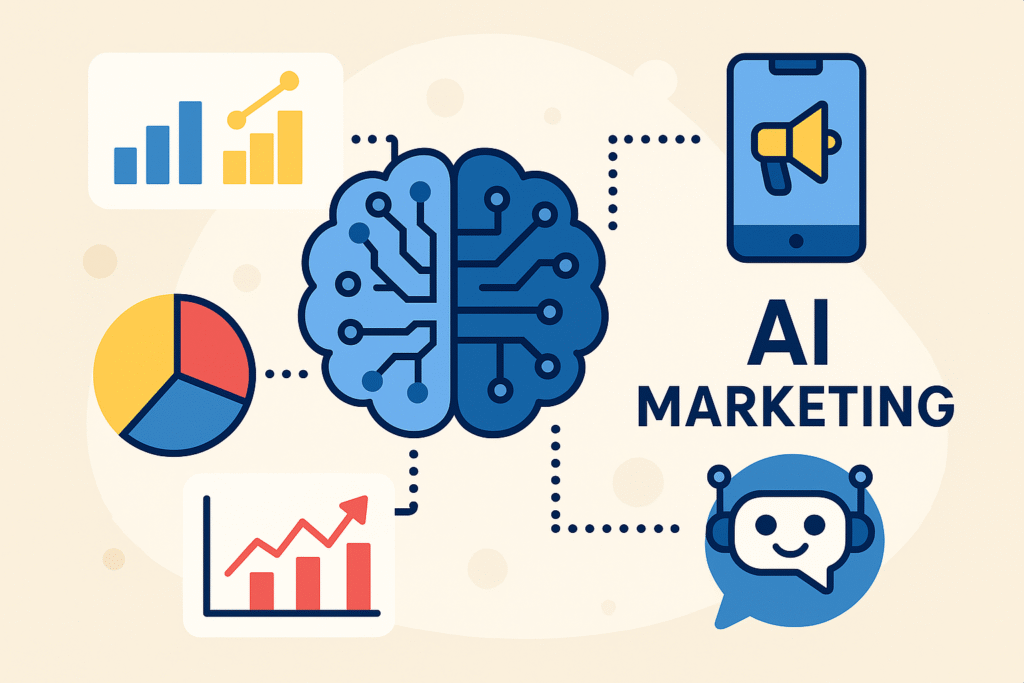
Artificial intelligence is no longer just a buzzword; it’s a core component of marketing strategies in 2025. Brands that embrace AI gain a competitive edge by automating tasks, personalizing experiences and maximizing return on ad spend. In this guide, you’ll discover how to integrate AI into your campaigns, why it matters, and practical steps to get started.
Before diving in, make sure you’ve explored our Start Here page, which lays the foundation for success. If you’re monetizing through ads, don’t forget to read our affiliate disclosure for transparency.
Why AI Matters for Marketers
AI can analyze massive datasets, uncover patterns and predict outcomes faster than any human team. Tools like predictive analytics, generative text, and AI‑driven segmentation allow marketers to anticipate customer needs and deliver relevant content. According to industry surveys, companies using AI see higher engagement and lower acquisition costs.
Key Applications of AI in Marketing
1. Personalization at Scale
Machine‑learning models can segment audiences based on behavior and interests. Use these insights to personalize emails, ads and product recommendations. See how this ties into optimizing ads on platforms such as Google Ads and Facebook vs. TikTok Ads.
2. Automated Creative Generation
Generative AI tools can produce ad copy and graphics based on your brand guidelines. This speeds up A/B testing and reduces creative burnout. Combine AI with insights from our Best Tools for Online Ads post to select the right platform.
3. Predictive Analytics and Budget Allocation
AI models forecast campaign performance, allowing marketers to reallocate budgets in real time. By pairing AI forecasting with frameworks like GA4, covered in our guide on GA4 Tag Manager Conversion Setup, you ensure accurate measurement.
4. Conversational AI and Chatbots
Chatbots deliver instant support, collect leads and guide users through the sales funnel. When combined with a high‑converting landing page, conversational AI boosts conversion rates.
Choosing the Right AI Tools
There are countless AI marketing tools on the market. Look for platforms that integrate with your current stack, support data privacy compliance and offer transparent reporting. Prioritize solutions with proven results and strong customer support.
Implementing AI: Best Practices
- Start Small: Begin with a single application—like automated email segmentation—to prove ROI.
- Train Your Team: Ensure your marketers understand AI fundamentals and can interpret insights.
- Integrate Data Sources: Feed your AI models with clean, unified datasets.
- Monitor and Iterate: AI models improve with feedback; continually refine campaigns based on results.
Challenges and Considerations
Despite the benefits, AI adoption has hurdles. Data quality issues, privacy regulations and algorithmic bias can impact performance. Marketers must stay current with regulations, especially when handling user data. Ethical considerations, transparency and consent management are non‑negotiable.
Future Trends in AI Marketing
Looking ahead, expect AI to integrate deeper into creative processes, from video generation to dynamic pricing. Large language models will evolve into intelligent agents, capable of autonomously managing entire campaigns. As AI capabilities grow, the role of marketers will shift towards strategy, oversight and brand storytelling.
Conclusion
AI‑powered marketing isn’t a fleeting trend; it’s the engine driving growth in 2025 and beyond. By adopting AI today, you position your brand at the forefront of innovation and deliver personalized experiences that resonate. Ready to take the next step? Explore our guides on monetizing Google Ads and selecting the best ad tools to complement your AI strategy.
Want more insights? Subscribe to our newsletter for weekly tips on maximizing your advertising returns.